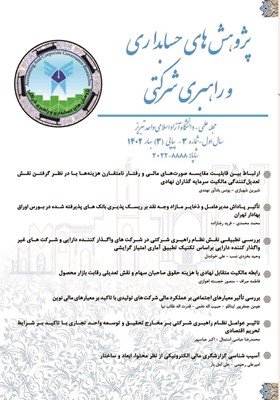بررسی تطبیقی نقش نظام راهبری شرکتی در شرکت های واگذار کننده دارایی و شرکت های غیر واگذار کننده دارایی بر اساس تکنیک تطبیق آماری امتیاز گرایشی
محورهای موضوعی : راهبری شرکتی
وحید بخردی نسب
1
![]() ,
علی خوشدل
2
,
علی خوشدل
2
1 - گروه حسابداری، واحد نجف آباد، دانشگاه آزاد اسلامی، نجف آباد، ایران
2 - دانشجوی دکتری، گروه حسابداری، دانشگاه آزاد اسلامی، واحد تهران مرکز
کلید واژه: نظام راهبری شرکتی, واگذاری داراییها, تکنیک تطبیق آماری,
چکیده مقاله :
در مطالعه حاضر، نقش سایر سهامداران بلوکی در محدود کردن تاثیر بزرگترین گروه سهامداران مورد بررسی قرار گرفته است. جامعه آماری پژوهش حاضر شرکت های پذیرفته شده در بورس اوراق بهادار تهران می باشد. همچنین حجم نمونه با استفاده از روش حذف سیستماتیک انتخاب و 183 مشاهده (شرکت-سال) به روش حذفی سامانمند طی بازه زمانی 1388 تا 1400 جهت بررسی آزمون فرضیه ها مورد بررسی قرار گرفت. روش پژوهشی بر اساس تکنیک تطبیق آماری مبتنی بر امتیاز گرایشی بوده و نرم افزار های مورد استفاده جهت اجرای این روش نرم افزار Oxmetrics 6، Stata12 و Eviews8می باشد. نتایج پژوهش نشان می دهد که واگذاری داراییها با مالکیت بزرگترین گروه سهامداران کاهش پیدا میکند و این موضوع میتواند با جلوگیری از حداکثر شدن ارزش شرکت، هزینههای مشخصی را به گروه سهامداران اقلیت تحمیل کند. در این رابطه وجود گروهی از سهامداران بلوکی با اهمیت دیگر در شرکت، میتواند منجر به خنثی شدن این جهتگیری در ارتباط با واگذاری داراییها شود. این یافتهها یک منطق اقتصادی را نشان میدهد که مطابق آن شرکتهای بهرهمند از ساختارهای مالکیت متوازن، احتمالاً دارای عملکرد بهتر نسبت به سایر شرکتها هستند. علاوه بر این وجود ساختار مالکیت فامیلی نیز میتواند مزایای مشابه برای شرکتها به همراه داشته باشد.
Divestitures have the potential to create shareholder value by helping firms optimize their portfolio of assets. Even so, firms do not necessarily take up divestitures because of agency problems. In fact, large controlling shareholders may prefer to extract private benefits of control at the expense of minority shareholders. In addition, divestitures may expose the misappropriation of corporate resources. In this paper, we explore the role that other blockholders play in constraining the largest shareholder’s influence. The study statistical population is the companies listed in Tehran Stock Exchange. Sample was determined by systematic elimination method and 183 observation (company-year) by systematic knockout method during the period of 2009 - 2022 to examine the hypothesis test. The research method is based on the Propensity score matching (PSM) statistical technique and the software used to implement this method is Oxmetrics 6 software, Stata12 software and Eviews8 software. The results indicate that divestiture activity decreases with the ownership of the largest shareholder, which imposes a cost to minority shareholders since the firm’s value is not maximized. The presence of another significant blockholder appears to curb this negative bias towards divestitures. This finding provides an economic rationale for the higher performance of firms characterized by more balanced ownership structures. Involvement of family owners also appears to provide similar benefits.
_||_

